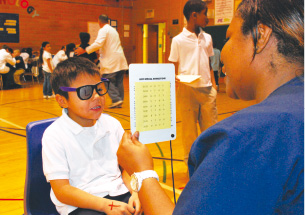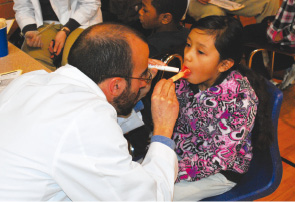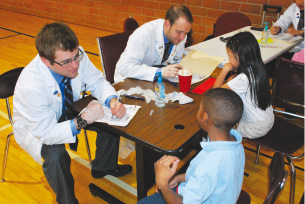
By Leslie Collins
Northeast News
January 25, 2012
Garfield Elementary School transformed itself into a doctor’s office Jan. 19, lining up students for free health screenings.
Scads of area medical students filled the auditorium and gymnasium, checking blood pressures, vision, hearing and more.
“For a lot of these kids, these are the only wellness exams they get,” said Dr. Rick Magie, D.O., Score 1 for Health medical director and chair of pediatrics at the Kansas City University of Medicine and Biosciences (KCUMB).
Founded in 1992, Score 1 for Health continues to provide free health screenings to elementary students in the Kansas City metro area, targeting schools with the highest number of children who qualify for free and reduced lunches. Each year, Score 1 screens more than 13,000 elementary students and has detected issues like tooth cavities, heart disease and tumors.
Score 1 Co-founder Deron Cherry said a local television news broadcast cemented the need for the program. Cherry watched in shock as newscasters relayed the story of a young girl soon to be placed in special education.
Teachers labeled the student with a learning disability, but then an eye doctor discovered she had an eye defect and simply needed glasses.
“I thought, ‘How many more of our kids are in school like her with problems that go undetected?'” the former Kansas City Chiefs football player and Chiefs’ Hall of Fame inductee said. “Something that we all need is our health.”
Hearing and vision impairment – even a toothache – can prevent children from learning, Cherry said.
“When a kid’s in the back with a toothache, the last thing they want to do is pay attention to the teacher,” he said. “It (Score 1 for Health) means everything to me. I want to make sure our kids have an opportunity to have a good start in life.”
Magie further stressed the need for the program, saying, “Most people don’t realize the number of underserved kids in Kansas City.”
On the east side of Kansas City, Mo., one in 10 children live without basic utilities like hot water at home, Magie said. One school he visited had a homelessness rate of one in 10 children. More than 40 percent of children screened have significant dental problems, he said.
One child’s vision now remains intact thanks to Score 1 screening, Magie said. If gone undetected, the child’s inflammatory eye disease would have eventually caused permanent blindness, he said.
Another role of Score 1 is “follow-up,” said Annette Campbell, director of Score 1 for Health.
“Follow-up is a big part of what we do,” she said.
Score 1 sends a child’s test results to parents, connects families to health clinics for low income residents, provides one-on-one dietician consulting and provides one-on-one health education called “pit stops” for parents. In addition, Score 1 uses dental grants and partnerships with area dentists to provide needed dental care.
To further the mission of Score 1, KCUMB has become a Score 1 co-sponsor with the Deron Cherry Foundation and has integrated the program into its curriculum by requiring students to provide services during Score 1 health screenings.
“The medical students absolutely love the opportunity to have this interaction (with children),” Campbell said.
KCUMB second-year medical student Lauren Lambeth agreed.
“It’s good practice,” Lambeth said. “The kids are fun to talk to.”
During a “rough week,” a Score 1 for Health day will instantly brighten her mood, she said.
As for Cherry, he said he’s grateful to see the program continue to thrive and expand.
“It’s something so simple,” he said of Score 1, ” but yet it has such a huge impact in these kids’ lives.”


















